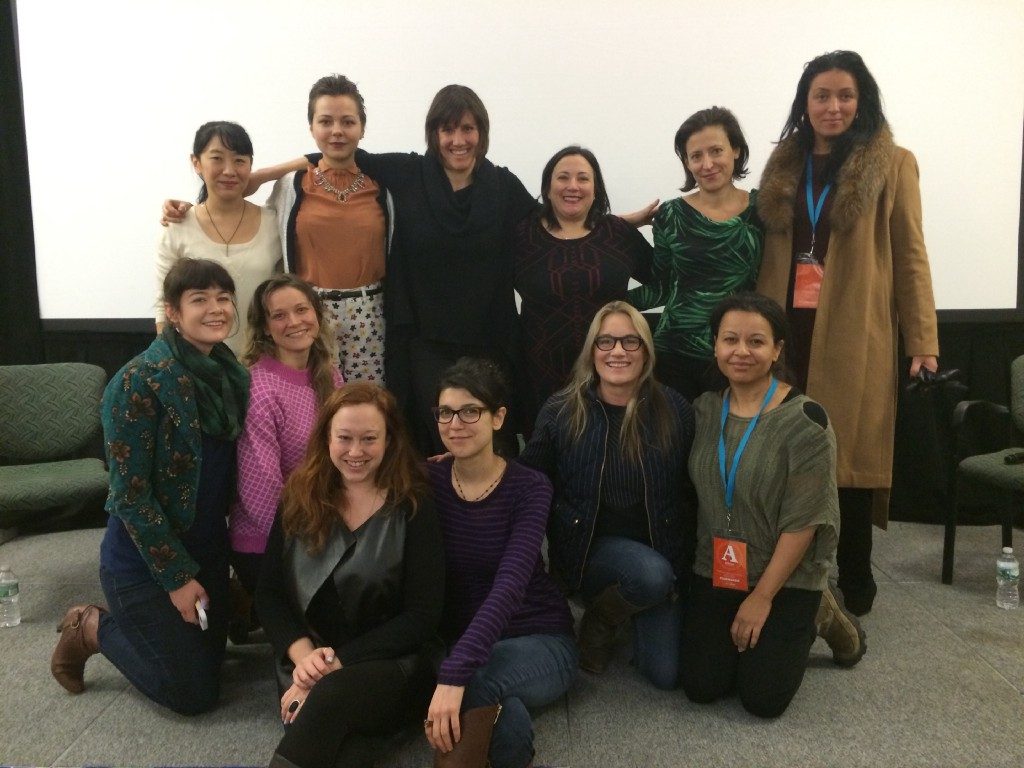On Friday, February 6th, the Film Fatales hosted
a panel discussion called “Working Together to Make Change” at the Athena Film
Festival.
The panel offered an introduction to the Film Fatales: an impressive group of female filmmakers who have banded
together to create a community of women who nurture and support each other in a
creative and professional field that doesn’t necessarily grant women the equal
rights you’d expect for such a supposedly “modern and progressive” society.
The collective’s members meet a certain criteria: Each
member must have directed at least one feature or documentary film. However,
they are sub-groups; a Film Fatales “shorts” group, a writing group, and so forth. The structure of the community includes once-a-month meetings in
which members mix a little, network a little, and discuss (a lot) a pre-selected film-related topic from which they can learn from one another. The
group hosts panels (like the one at Athena) and attends other events, which provide opportunities to discuss crowd-funding, networking, and promoting films made by women.
Film Fatales was founded by Leah Meyerhoff, who served as the moderator for the panel. Meyerhoff had a few female filmmakers
over to dinner to discuss making movies. She was essentially searching for a
community in a competitive and frequently unfriendly field that seemed stacked against women. Soon enough, more and more female filmmakers experiencing that same
sense of isolation wanted to join the group. The need for a support system was evidently rampant, and Meyerhoff found a much-needed solution for it. She began
hosting the monthly meetings and called the group “Film Fatales.” With time,
the group became even bigger and, over the course of a year, chapters sprung up in LA, Austin, Chicago, New Orleans, Detroit, Toronto, Sao Paolo, and Sydney.
The panelists hosting “Working Together to Make Change”
included the NY-based documentary filmmaker Lynn True, writer/producer/director
Deborah Goodwin, filmmaker/cinematographer Lina Plioplyte, and director Lara
Zizic. The discussion began with an introduction much like the one at the beginning of
this article — a who, what, why, how — before expanding into an open discussion
with the audience who, unsurprisingly, consisted mostly of women curious about
the statistics, how they can find that same sense of support, what they can do
to make change, and how they should go about throwing themselves into the
business as a female wanting to work in the world of film.
At one point, a well-meaning man within the
audience took the microphone to offer his support. “You guys do have hope,” he said. He pointed to Kathryn Bigelow’s Best Director Oscar for “The Hurt Locker” as proof. The man really did mean well, but ended up unintentionally bolstering the argument the filmmakers on stage had been trying to make: the
hyper-focus on one success story doesn’t change the game for the rest of us.
There’s still a lot more work to do.
And the statistics certainly prove that point. There is a definite
lack of opportunities for women both behind and in front of the
camera. And who’s behind the camera certainly influences who gets in front of it; it’s not just women directors who are missing, but girls and women’s stories, too. Citing a study by the Geena
Davis Institute on Gender in Media, the panelists pointed out that just 30% of
characters onscreen are female. Considering that half of the human population is
female, the numbers seem a bit lacking.
At one point in the discussion, the topic of film school came up. Several of the panelists had not attended film school but had instead
adopted a do-it-yourself method in becoming filmmakers. The amazing thing about
groups like the Film Fatales is that they offer the kind of support and inspiration one might get from film school. Of course film school offers so
much in terms of a structured education with outlets for free equipment and
experimentation, and these DIY groups cannot necessarily offer the same. But
groups like these can inspire those who can’t necessarily make it the film-school route to go at it on your own with a team behind you, believing in the
work that you do.
For aspiring female filmmakers, this is exactly what we
need. Had there been such a giant network creating awareness of the
unfortunate inequality present and evident within this field, the ballpark may
be a bit different. And hopefully, with time — and a few undeniably powerful Film
Fatales — the landscape will change.
Hillary Sproul is a New York-based writer.






